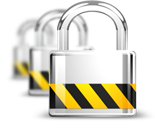PHP updated to version 5.2.8
This night we updated our web servers, and now they run PHP version 5.2.8. More than 170 errors are fixed since version 5.2.6.
A full list of changes can be found on php.net.
This night we updated our web servers, and now they run PHP version 5.2.8. More than 170 errors are fixed since version 5.2.6.
A full list of changes can be found on php.net.
Gigahost can now register and transfer the following types of domain names:
.ag, .asia, .bz, .cn, .hn, .lc, .me,. mobi
As a time-limited offer, .cn domains are only £1.50 including VAT! A complete price list for domain services can be found in the Control Center.
Update, June 2010: We can no longer register .cn domain names, because the requirements to do so have become too strict.


During the last couple of days, some Gigahost customers were so unfortunate to be met by their web pages being hacked, in most cases by some “Muslem Hacker” or “Saudi Arabian hacker”. Follows, some security tips on how not to get hacked.